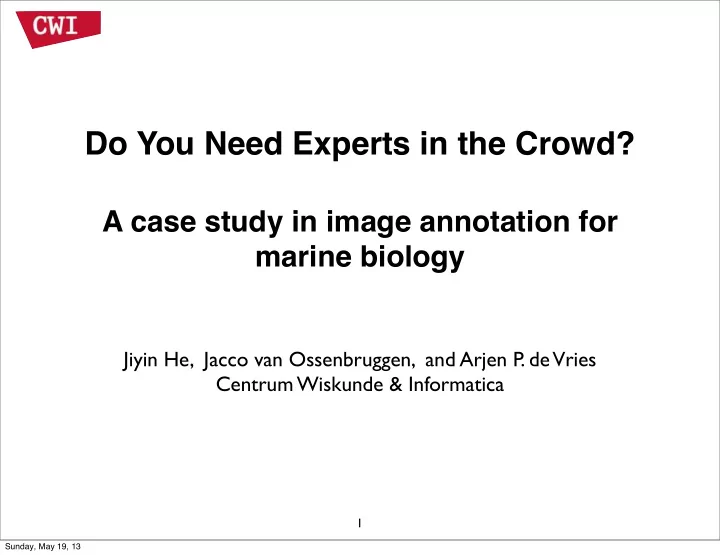

Do You Need Experts in the Crowd? A case study in image annotation for marine biology Jiyin He, Jacco van Ossenbruggen, and Arjen P . de Vries Centrum Wiskunde & Informatica 1 Sunday, May 19, 13
An image labeling problem that requires specialists’ knowledge 2 Sunday, May 19, 13
An image labeling problem that requires specialists’ knowledge What is in the picture? 2 Sunday, May 19, 13
An image labeling problem that requires specialists’ knowledge What is in the picture? - A fish 2 Sunday, May 19, 13
An image labeling problem that requires specialists’ knowledge What is in the picture? - A fish Which species is it? 2 Sunday, May 19, 13
An image labeling problem that requires specialists’ knowledge What is in the picture? - A fish Which species is it? - Chaetodon trifascialis 2 Sunday, May 19, 13
Some background Computer ! d e d e vision systems e N h t u r t d Recognition n Videos u Detection o r Tracking G Underwater cameras 3 Sunday, May 19, 13
Fish species recognition • Large set of labeled images/videos needed • Expert knowledge needed • Non-experts often lack the knowledge needed to recognize a fish • Non-experts may not be able to map the common name of a fish to its scientific name • Experts are expensive, rare resources • Even experts can have their expertise in different types of fish or fish in different areas 4 Sunday, May 19, 13
What can non-experts (not) do? • Assumptions • Non-experts are not able to actively name fish species • But may able to passively judge if two fish are visually similar • Possible tasks • Manual clustering • Classification with textbook images as category labels 5 Sunday, May 19, 13
An interface to support fish recognition with experts - collecting ground truth 6 Sunday, May 19, 13
An interface to support fish recognition with non-experts • 7 Sunday, May 19, 13
Experts vs. non-experts Candidate Verification source source From their Experts Text book knowledge Non- Given by the System feedback experts system 8 Sunday, May 19, 13
A study of non-expert annotators • Can non-experts effectively separate similar species given the current setup? • Can non-experts learn during the labeling process, e.g., from the system feedback? 9 Sunday, May 19, 13
A study of non-expert annotators • Controlled experiments • 190 expert labeled images • 3 experts provided ground truth • 2 simulated labeling conditions Exp Candidate type #Users # Labels/image True label is present together with 1 22 19 similar but incorrect labels In 25% of the cases, true labels 32 2 were removed, while similar but 13 (28 +4) incorrect labels are present 10 Sunday, May 19, 13
Reliability of non-expert labels • Compared to expert labels • agreement in terms of Cohen’s kappa; • non-experts labels aggregated by simple majority voting Expr. Expert vs. Species level Family level - expert 0.55~0.67 0.75~0.85 1 non-experts 0.55~0.65 0.72~0.83 non-experts 2 0.45~0.65 0.68~0.73 (new) non-experts 2 0.53~0.68 0.74~0.80 (old) 11 Sunday, May 19, 13
Do non-experts learn? • Two types of learning • Memorization • Generalization Exp. Memo Memorization zation Generalization Genera zation labels 1 2 3 1 5 10 0.38 0.46 0.51 0.59 1 0.30 0.42 2 (new) 0.30 0.4 0.44 0.37 0.58 0.62 Average user s er scores tha that are norma normalized by by the maxim maximum score o re one can achieve at each each label bel 12 Sunday, May 19, 13
Conclusions • Converting an active labeling task to a passive image comparing task allows non-expert users to perform image labeling task that requires highly specialized knowledge • In ideal case, non-experts can achieve an agreement with experts comparable to that achieved between experts • In the more confusing case, novice non-experts are more likely get confused compared to experienced users • Non-expert users are able to learn in terms of both memorization and generalization 13 Sunday, May 19, 13
Sunday, May 19, 13
Reliability of non-expert labels • Accuracy of aggregated labels • Novice users are likely to be confused when correct labels are not present Expr. User type Species Species level Family l mily level ndcg@1 ndcg@5 ndcg@1 ndcg@5 1 22 new users 0.84 0.88 0.93 0.94 2 28 new users 0.72(<) 0.77(<) 0.86(<) 0.94 2 4 old users 0.88 0.86 0.91 0.94 15 Sunday, May 19, 13
Main findings • When expert feedback is available • In ideal case, non-experts can achieve an agreement with experts comparable to that achieved between experts • In the more confusing case, novice non-experts are more likely get confused • Implication: It’s important to select good candidates • When expert feedback is not available • Can aggregation on noisy feedback generate reasonable results? • If not: • More sophisticated aggregation method • More users - reach sufficient confidence • Training session with expert feedbacks before labeling 16 Sunday, May 19, 13
Main findings (2) • Non-experts learn while playing the game • memorizing - performance on same image improves • generalization - performance on same species improves • When there is no feedback (3 users) • 3 users set the initial labels for the peer-agree runs - work independently • User score with experts: • each judgement gets 0, 1, 2, 3 points if agree with 0, 1, 2, or 3 experts • 50 images per session • Users seem to be able to improve without feedback (Need more evidence), to what limit? user session 1 session 2 session 3 session 4 1 92 99 116 101 2 69 94 90 99 3 83 81 93 90 17 Sunday, May 19, 13
Some images are more confusing than others • Let clarity score = #majority vote/#vote • Per image clarity score in Experiment 1 4/23 25/25 votes votes 4/23 votes 24/24 votes 4/22 votes 24/24 votes 18 Sunday, May 19, 13
Recommend
More recommend